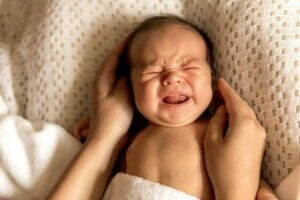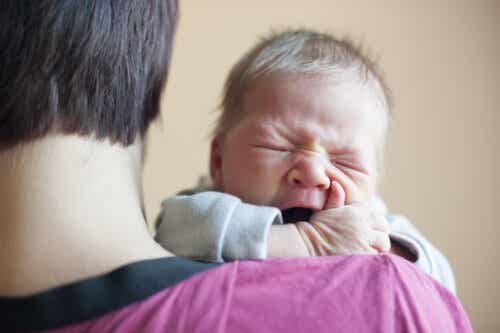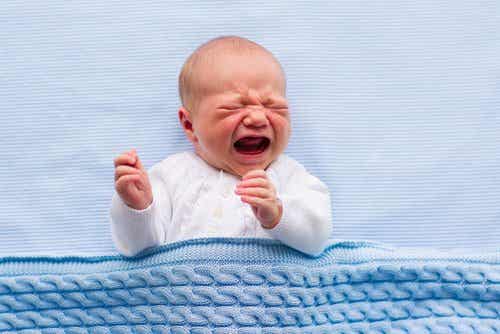When a Baby Cries to Release Stress, It's Healthy


Written and verified by the psychopedagogue María José Roldán
For new parents, when a baby cries, it can be one of the most stressful aspects of parenting. And it’s very easy to judge our parenting success based on how much or how little our babies cry. But it’s not real. Babies crying is normal and even healthy for them, because it’s their way of communicating with you.
Also, babies don’t only cry in order to get their basic needs met, such as eating, sleeping, or physical contact. It’s also a healing process to recover from stress and discomfort.
The main functions of crying
It’s important to distinguish between the two main functions of crying. The primary function is to communicate immediate needs and discomfort, such as feeding, holding, changing a diaper, or an extra blanket. The secondary function is that of a stress release mechanism.
Babies sometimes cry for long periods of time even though they’ve no immediate need except for you to hold and love them. They’re releasing accumulated tensions through crying, and this helps them to relax.
Tears contain cortisol, the stress hormone, so crying lowers blood pressure and heart rate. Crying also activates the parasympathetic nervous system, which acts as a self-soothing mechanism.

Other reasons why it’s healthy when a baby cries
There are also other, more important reasons why a baby may cry. Psychotherapist Michael Appleton says that we have a cultural blind spot about the effect of birth on babies and that it can be as difficult for them as it can be for mothers.
There may be other factors, such as early medical interventions, that could be distressing to babies and cause them to cry more. Also, mothers who were stressed during pregnancy tend to have babies who cry more.
None of these reasons are the fault of the parent or their parenting skills. And yet, because this information isn’t widely known, many parents feel distressed and blame themselves. This can lead to anxiety and the thought in parents that they’re failing. And new mothers should be careful because these thoughts could cause postpartum depression.
Understanding crying
Once parents understand their baby’s crying, parental stress disappears because they know what their baby needs. Babies simply cry because they need to let off that cortisol that’s flooding them in order to feel better. Crying doesn’t hurt them and when you stop trying to interfere with their attempts to work out their frustrations on their own, both parents and babies feel calmer.

If they cry excessively and don’t seem to be any happier after crying, then it could be that the crying is a sign of a physical problem, such as an allergy or digestive condition.
When a baby cries offer reassurance
When our babies cry, we should always go through our needs checklist. If we’re sure that all of the little one’s needs are met and they’re still crying, then we can hold them in our arms. Just being there to listen and reassure them that, although they may be experiencing sad feelings, they’re safe and loved and your presence calms them.
The good news about crying is that it’s a form of healing and recovery. It’s the way we lighten the load of our emotions. We don’t have to be perfect parents, we just need to be there when our children want to express how they feel, no matter how old they are.
For new parents, when a baby cries, it can be one of the most stressful aspects of parenting. And it’s very easy to judge our parenting success based on how much or how little our babies cry. But it’s not real. Babies crying is normal and even healthy for them, because it’s their way of communicating with you.
Also, babies don’t only cry in order to get their basic needs met, such as eating, sleeping, or physical contact. It’s also a healing process to recover from stress and discomfort.
The main functions of crying
It’s important to distinguish between the two main functions of crying. The primary function is to communicate immediate needs and discomfort, such as feeding, holding, changing a diaper, or an extra blanket. The secondary function is that of a stress release mechanism.
Babies sometimes cry for long periods of time even though they’ve no immediate need except for you to hold and love them. They’re releasing accumulated tensions through crying, and this helps them to relax.
Tears contain cortisol, the stress hormone, so crying lowers blood pressure and heart rate. Crying also activates the parasympathetic nervous system, which acts as a self-soothing mechanism.

Other reasons why it’s healthy when a baby cries
There are also other, more important reasons why a baby may cry. Psychotherapist Michael Appleton says that we have a cultural blind spot about the effect of birth on babies and that it can be as difficult for them as it can be for mothers.
There may be other factors, such as early medical interventions, that could be distressing to babies and cause them to cry more. Also, mothers who were stressed during pregnancy tend to have babies who cry more.
None of these reasons are the fault of the parent or their parenting skills. And yet, because this information isn’t widely known, many parents feel distressed and blame themselves. This can lead to anxiety and the thought in parents that they’re failing. And new mothers should be careful because these thoughts could cause postpartum depression.
Understanding crying
Once parents understand their baby’s crying, parental stress disappears because they know what their baby needs. Babies simply cry because they need to let off that cortisol that’s flooding them in order to feel better. Crying doesn’t hurt them and when you stop trying to interfere with their attempts to work out their frustrations on their own, both parents and babies feel calmer.

If they cry excessively and don’t seem to be any happier after crying, then it could be that the crying is a sign of a physical problem, such as an allergy or digestive condition.
When a baby cries offer reassurance
When our babies cry, we should always go through our needs checklist. If we’re sure that all of the little one’s needs are met and they’re still crying, then we can hold them in our arms. Just being there to listen and reassure them that, although they may be experiencing sad feelings, they’re safe and loved and your presence calms them.
The good news about crying is that it’s a form of healing and recovery. It’s the way we lighten the load of our emotions. We don’t have to be perfect parents, we just need to be there when our children want to express how they feel, no matter how old they are.
This text is provided for informational purposes only and does not replace consultation with a professional. If in doubt, consult your specialist.








